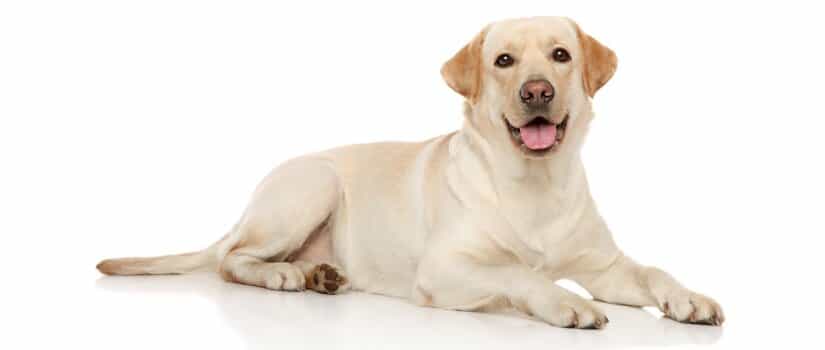The Labrador Retriever was bred as an all-purpose water dog breed that originated from Canada. The Labrador Retriever originated in the early 1800s and were of varying sizes like the Lesser or the St. John’s Newfoundland which was the earliest incarnation of the Labrador. These were black Labradors that were medium-sized with short hair. They retrieved game and fish, pulled small fishing boats for fisherman in icy water, and also helped fisherman with their daily work.
The Labrador Retriever is part of the UKC, Gun Dog Group, and the AKC, Sporting Group and was recognized by the English Kennel Club in 1903 and by the American Kennel Club (AKC) in 1917. During the 19 century, British breeders refined the Lab and helped to standardize the breed.
This breed’s popularity continues to grow because few other breeds compare in temperament and overall excellence in dog sports and training. The Labrador Retriever Club is the only organization recognized by the American Kennel Club (AKC) as the national parent club of the Labrador Retriever.
This club was established in 1931 in New York. Additionally, the first Retriever field trial licensed by the AKC was held on December 21, 1931. That same year, on October 24, the Labrador Retriever Club was incorporated under the State of New York laws by a group of sportsmen led by Franklin B. Lord.




History
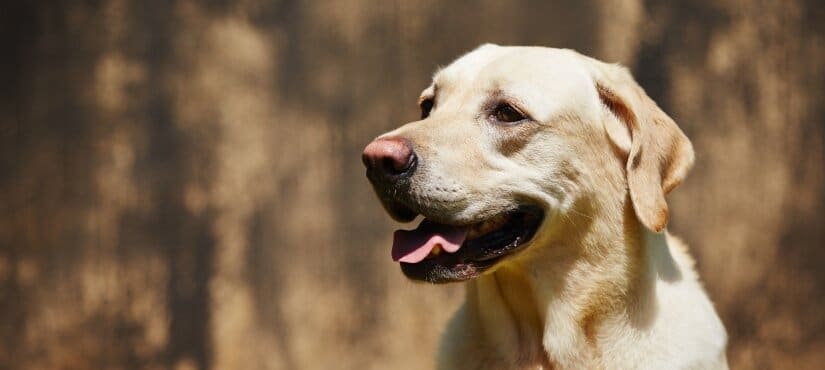
The Labrador was bred as a hunter and water retriever. These dogs helped the fisherman in all tasks related to fishing. The Labrador Retriever became a distinct breed by the mid-nineteenth century.
Today the Labrador is one of the most popular dog breeds in the US and still participates in hunting and other jobs like search and rescue, detection work, medical service alert dogs, and as a companion dog. This is an athletic dog breed with a well-balanced conformation that allows it to function as a retrieving Gun dog.
It was bred to hunt waterfowl and game for long hours under challenging conditions. This dog breed has the ability to win in the show ring because of its character and the quality of the breed. The Labrador Retriever has one of the best temperaments and is one of the best companion breeds. Not only is this wonderful dog breed intelligent and loyal, but the Retriever really enjoys being around children and other pets.
Physical Description
The Labrador Retriever has large, kind, and friendly eyes and a broad head with a black or brown nose. This is a medium to large-sized muscular dog breed. Eye color should be brown in black and yellow Labradors and brown or hazel in chocolate Labradors.
Retrievers can be yellow, brown or black, and have short triangular-shaped drop ears. The tail is long and thick and rather otter-like. The coat is a double coat. The double coat has a short, dense undercoat and a short, water-resistant straight outercoat that can be black, yellow, or chocolate. The undercoat is weather-resistant and provides protection from harsh weather conditions and all types of terrain. White spots on the chest are also accepted.
Temperament
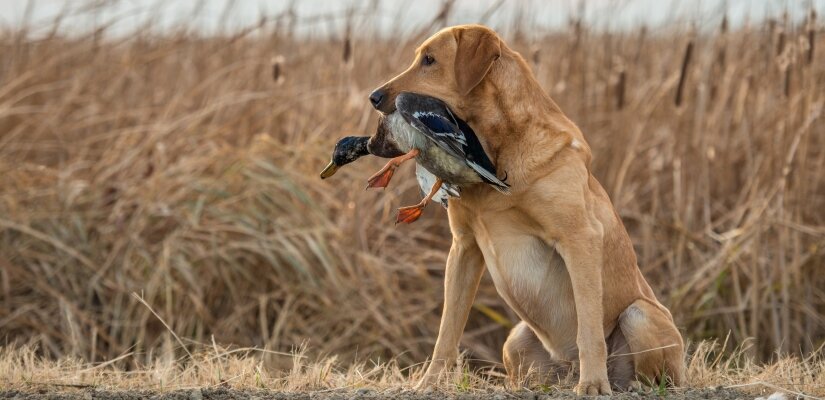
The Labrador Retriever is social, even-tempered, and, when trained, an obedient and amiable companion dog. This dog breed tolerates other pets and children and does well with plenty of space to run around in. Although a calm housedog, this is a powerful dog breed that needs regular exercise and mental challenges to keep it busy.
Bored Labradors can get into trouble, and if Labs are not trained, they tend to be hyperactive and over playful. The Labrador’s hunting instinct may lead it to straying. This dog breed enjoys swimming and retrieving objects in his mouth.
The AKC adds that “True Labrador Retriever temperament is as much a hallmark of the breed as the “otter” tail. The ideal disposition is one of a kindly, outgoing, tractable nature; eager to please and non-aggressive towards man or animal. The Labrador has much that appeals to people; his gentle ways, intelligence and adaptability make him an ideal dog. Aggressiveness towards humans or other animals, or any evidence of shyness in an adult should be severely penalized.”
Special Needs
The Labrador Retriever requires daily exercise, socialization, and positive dog training. This is an all-purpose water dog with plenty of energy. This breed is a hardy and sporty dog breed that needs to be around active pet parents or live on a large farm where he can run freely and swim in lakes and rivers. Pet parents should consider dock diving, agility, flyball, obedience, hiking, and canine surfing if living in a suburban area.
Possible Health Concerns
The Labrador Retriever is a healthy dog breed, yet may be susceptible to the following health problems:
- Hip Dysplasia is the abnormal development of the hip joint in large dog breeds. It is generally characterized by a loose joint and then degenerative joint disease. The Labrador should be fed a high-quality diet that is geared towards their life stage.
A puppy Lab should only be provided high-quality puppy dog food. Excessive growth, types of exercise, nutritional factors, and hereditary factors all play with hip dysplasia. Ask your vet for the best nutritional advice for active dogs like the Labrador Retriever. - Bloat or gastric dilation often occurs in larger breeds. Exercise needs to be avoided right after eating or drinking large amounts of water. Left untreated, this will usually result in death. Symptoms include dry retching, vomiting, pacing, heavy panting, and an enlarged abdomen. Contact your emergency veterinarian right away, even if it’s the middle of the night. This condition cannot wait to be treated and is considered an emergency.
- Progressive Retinal Atrophy (PRA) is the name for a group of diseases that cause degeneration of the retina. This will include inherited abnormalities of light-sensitive cells.
Nutrition
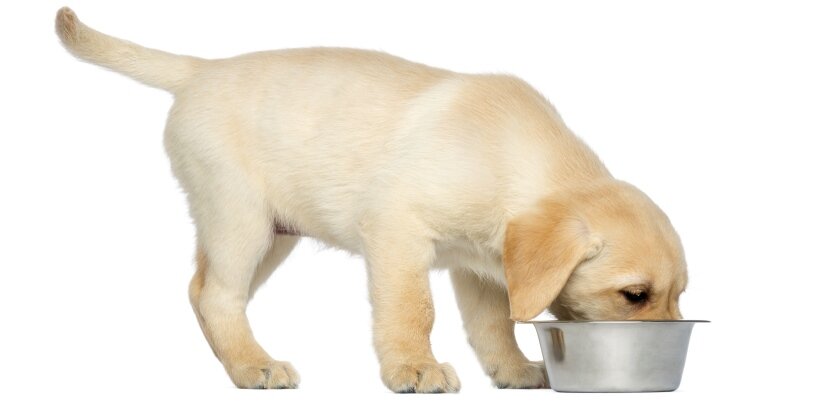
All dog breeds, regardless of size and age, need to be fed a high-quality diet. With so many high-quality dog food brands out there today, choosing the right one for your Lab is easy.
Labrador dog parents should never underestimate the importance of high-quality, balanced nutrition for all dog breeds.
Start by you assessing your Lab’s activity level, age, breed, and any medical conditions that he or she may be prone to when selecting the best dog food. With options like bison, duck, venison, quail, wild boar, lamb, salmon, and turkey, dog food brands offer unique and unusual protein sources that are healthy for active dogs. Consult with your veterinarian if your dog shows signs of food allergies.
Some dog food formulas contain probiotics, salmon oil, and guaranteed calcium and phosphorus levels to help support your pup’s teeth and bones’ healthy development.
For older dogs, look for recipes that offer glucosamine and chondroitin for hip and joint wellness. The protein options can include turkey and chickpea stew, salmon and chickpea stew, and a chicken with chickpea with no artificial flavors, corn, or soy in the ingredients.
- There is no “best diet.” Dogs are individuals. A diet that works for one Lab may not be the best for another. Age, energy level, and individual medical concerns play a large role for each dog.
- The recommended guidelines on bags often contain more calories than dogs need. Unless your Lab a very energetic (and intact) animal, veterinarians will usually recommend feeding the lower end of the recommendation.
- Feed a complete and balanced food for the appropriate life stage of your dog. Always consult with your veterinarian if your Lab develops food allergies and needs a change of diet. Some Labs may have special needs like a weakened immune system. Adding supplements is always a good idea.
Grooming
The Labrador Retriever is a shorthaired dog breed with a soft undercoat and a slightly rough outer coat. This breed needs to be brushed every day and bathed regularly. Labrador coats shed water quickly, and this breed needs weekly brushing to remove dead hair. The coat is thick and is water repellant. This breed also sheds.
If your Lab has dry skin, use a natural shampoo that soothes and heals. That said, nails need to be trimmed when needed and ears cleaned. Overgrown nails can splay toes and cause pain. Teeth need to be brushed every day.
Your Labrador is going to need regular dental care. Dogs develop gum disease from tartar buildup and need a twice-yearly professional dental cleaning.
Adopting a Labrador Retriever
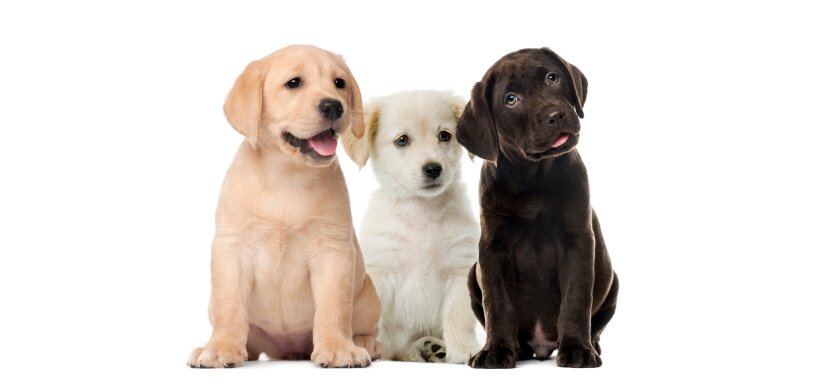
Gun and sporting dog breeds like the Labrador Retriever make excellent companions. They are loyal, fun, active, and love children. Gun dogs were bred to accompany hunters when out hunting for large game birds. Additionally, this breed is used to being around people and was bred to be enthusiastic, social, and friendly. This breed loves being outdoors and is a very sporty dog breed that enjoys hiking trips and going camping with the family.
Potential pet parents to the Labrador should be active and love the outdoors come rain or shine. These gentle and wonderful dogs are so easygoing and even-tempered.
Always opt for dog adoption as opposed to purchasing from a pet store or online. Do your research on your dog breed, and as usual, spend time with your potential Labrador Retriever before adopting and bringing him home.
Labrador Retriever Breeders in the USA
Iowa Pointing Labs (Iowa)
- Address
- Knoxville, IA
- Website
- iowapointinglabs.com
- Phone
- (515) 8055927
- iowapointinglabs1@gmail.com
Hunters Point Kennel (Iowa)
- Address
- Marshalltown, IA
- Website
- www.pointing-lab.com
- Phone
- Empress Labradors
- hunterspointkennel@gmail.com
Empress Labradors (Illinois and Wisconsin)
- Address
- Illinois and Wisconsin
- Website
- www.empresslabradors.com
- Phone
- (815) 2188765
- dawnnacey@gmail.com
Simpson’s Labrador Retrievers (Illinois)
- Address
- Red Bud, IL
- Website
- labpuppiesillinois.com
- Phone
- (618) 6157006
- g_sn_08@hotmail.com
Smoky Mtn Labradors (Tennessee)
- Address
- Knoxville, TN
- Website
- www.smokymtnlabrador.com
- Phone
- (865) 4401100
- gene@smokymtnlabradors.com
Dawson Labs (Missouri)
- Address
- Claycomo, MO
- Website
- www.dawsonlabs.com
- Phone
- (816) 8386811
- jason@dawsonlabs.com
Silver & Charcoal Kennels (Mississippi)
- Address
- Greenwood, MS
- Website
- www.silverandcharcoalkennels.com
- Phone
- (662) 2995435
- info@silverandcharcoalkennels.com
Snowy Pines White Labs (Arkansas)
- Address
- Batesville, AR
- Website
- www.snowypineswhitelabs.com
- Phone
- (870) 8056039
- puppies@snowypineswhitelabs.com
Amber Sky Labradors (Ohio)
- Address
- Columbia Station, OH
- Website
- amberskylabradors.com/index.html
- Phone
- (440) 5375013
- russkrivak@gmail.com
Sunny Creek Labs (Ohio)
- Address
- Greenville, OH
- Website
- www.sunnycreeklabs.com
- Phone
- (937) 6214357
- response.sunnycreeklabs@gmail.com
Laurkim Labradors (Ohio)
- Address
- Medina, OH
- Website
- laurkimlab.com/index.html
- Phone
- (330) 4211603
- Laurakimlab@me.com
Cherryacre Labradors (Michigan)
- Address
- Plymouth, MI
- Website
- www.cherryacrelabradors.com
- Phone
- (734) 3416204
- tmicall2@gmail.com
Michigan Elite Labradors (Michigan)
- Address
- Wheeler, MI
- Website
- www.mielitelabs.com
- Phone
- (989) 3267928
- SteveAndAlisha@mielitelabs.com
Lakota Retrievers (Michigan)
- Address
- Lenox, MI
- Website
- www.lakotaretrievers.com
- Phone
- (630) 2923658
- paul@lakotaretrievers.com
Prospect Hill Labrador Retrievers (New York State)
- Address
- Wallkill, NY
- Website
- prospecthilllabradorretrievers.com
- Phone
- (845) 7874872
- pups@prospecthilllabradorretrievers.com
Breeders in the Canada
Luckyshoes Retrievers
- Address
- Kamloops, British Columbia
- Website
- www.luckyshoes.ca
- Phone
- (250) 8281525
- dean@dogacademy.ca
Prairiestorm Kennel
- Address
- Saskatoon, Saskatchewan
- Website
- www.prairiestorm.ca
- Phone
- (306) 9312026
- danielle@prairiestorm.ca
Trailrunners Reg’d
- Address
- Big River, Saskatchewan
- Website
- www.trailrunners.ca
- Phone
- (306) 4698009
- trailrun@sasktel.net
Rickway Kennels
- Address
- Anola, Manitoba
- Website
- rickway.com
- Phone
- (204) 7552338
- rickway@rickway.com
Wimberway Kennels
- Address
- Powassan, Ontario
- Website
- www.wimberway.com
- Phone
- (705) 7242676
- sandy@wimberway.com
Cooperslane
- Address
- Arthur, Ontario
- Website
- www.cooperslane.com
- Phone
- (519) 8486192
- valerie@cooperslane.com
Baypoint Kennels
- Address
- Port Rowan, Ontario
- Website
- www.baypointkennel.com
- Phone
- (519) 4299120
- baypt.kennels@gmail.com
Huntsdown Perm Reg’d
- Address
- Erb’s Cove, New Brunswick
- Website
- huntsdown.ca
- Phone
- (506) 8327252
- huntsdown@xplornet.ca
Labrador Rescue Groups in the USA
Golden Gate Labrador Retriever Rescue
- Address
- San Francisco Bay Area, CA
- Website
- www.labrescue.org
- Phone
- (415) 6526091
- krisellen.nm@gmail.com
Southern California Labrador Retriever Rescue
- Address
- Torrance, CA
- Website
- www.sclrr.org/rescue/
- Phone
- (888) 554ALAB
Lab Rescue LRCP
- Address
- Maryland, Virginia, Washington DC, West Virginia, Pennsylvania, Delaware, and North Carolina
- Website
- www.lab-rescue.org
- Phone
- (301) 299-6756
- info@lab-rescue.org
Labrador Retriever Rescue of Florida
- Address
- Pompano Beach, FL/dd>
- Website
- lrrof.org
- Phone
- (877) 5227352
- info@lrrof.org
Midwest Labrador Retriever Rescue
- Address
- Lombard, IL
- Website
- mlrr.org
- Phone
- (847) 7806577
- mail@mlrr.org
Safe Harbor
- Address
- Golden, CO
- Website
- www.safeharborlabrescue.org
- Phone
- (303) 4647777
- info@safeharborlabrescue.org
Central Indiana Lab Rescue
- Address
- Indianapolis, IN
- Website
- www.cilra.org
- Phone
- (888) 8821900
